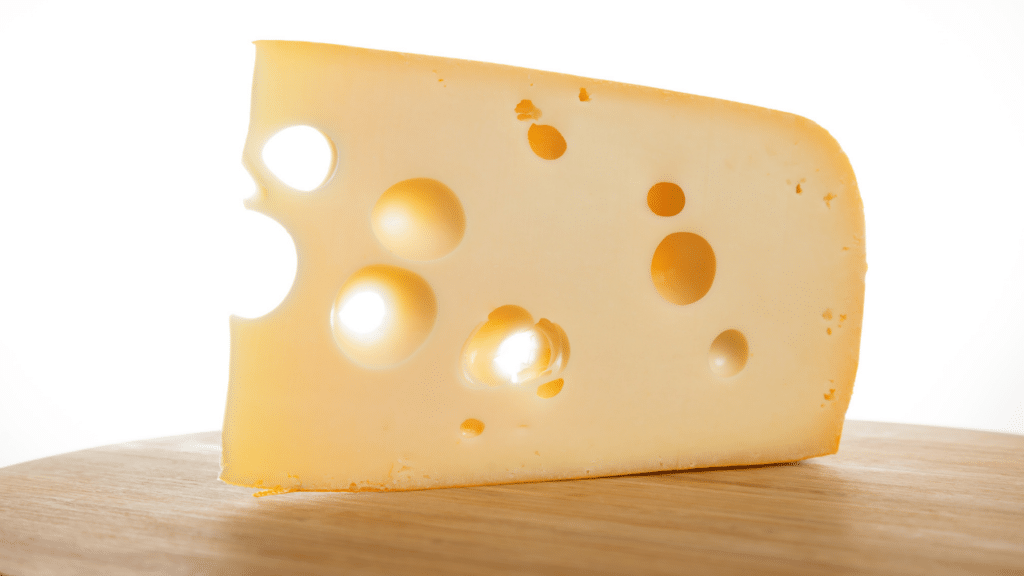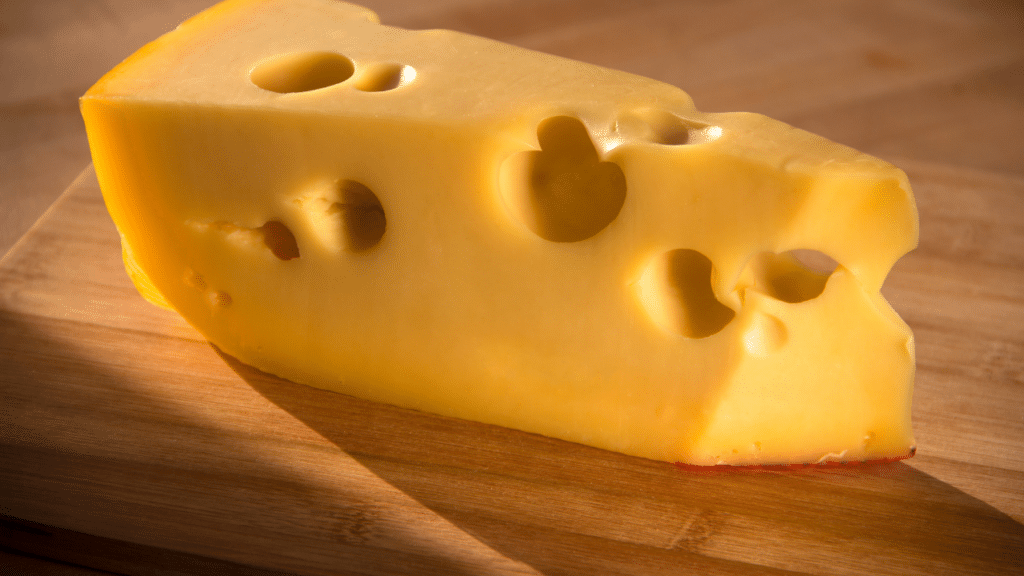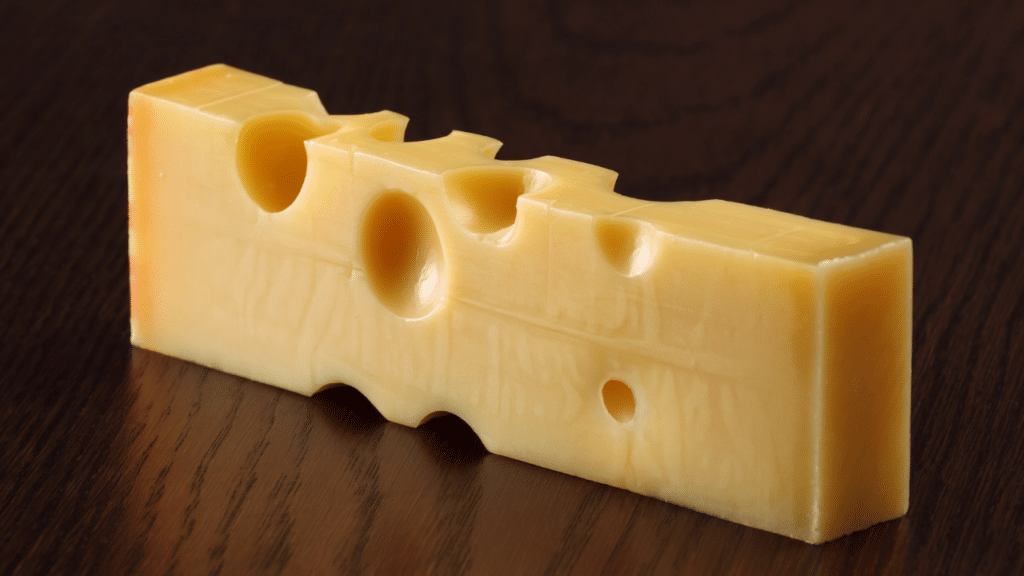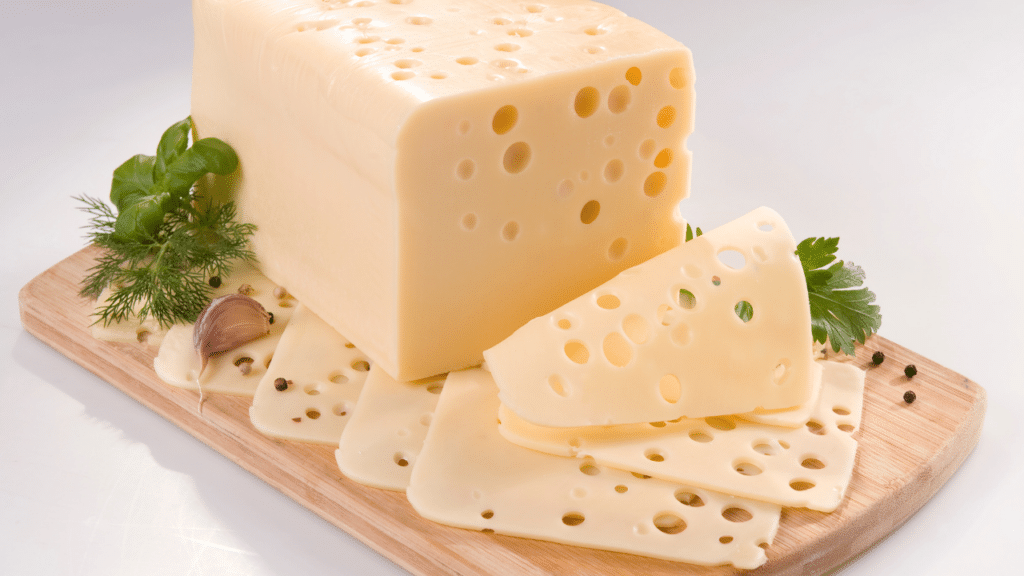Swiss cheese, known for its distinctive holes (or “eyes”) and nutty flavour, is well-received by many people. However, taste preferences are subjective; another might enjoy what one person finds unpleasant. If someone perceives Swiss cheese as tasting bad, it could be due to various reasons.

Also Read: How Pepper Jack Cheese is Made? A Spicy Revelation!
Contents
- 1 Why Does Swiss Cheese Taste Bad?
- 2 5. Pairing and Context
- 3 What is the science behind Swiss Cheese?
- 4 Why Does Swiss Cheese Taste So Different?
- 5 Why does Swiss cheese taste like that?
- 6 Why does my Swiss cheese taste bitter?
- 7 How do you make Swiss cheese taste good?
- 8 Why does Swiss cheese have holes?
- 9 Is Swiss cheese healthy?
- 10 Conclusion
Why Does Swiss Cheese Taste Bad?
Swiss cheese is generally very popular for its nutty flavour. Sometimes Swiss cheese tastes very bad. In this article, we will know in detail what causes the taste of Swiss cheese to be bad and how to improve its taste:
1. Personal Taste Preferences
Different people have different preferences when it comes to flavours. Some may not enjoy the nutty and slightly sweet taste of Swiss cheese.
2. Sensitivity to Aromas
Swiss cheese has a strong aroma, and some individuals are sensitive to certain smells. If someone is particularly sensitive to the odour of Swiss cheese, it may affect their perception of its taste.
3. Quality and Freshness
The quality and freshness of the cheese can greatly influence its taste. If Swiss cheese is not stored or handled properly, it can develop off-flavours or become rancid.
4. Variations in Brands and Types
Different varieties of Swiss cheese, such as Emmental and Gruyère, each with its own flavour profile. If someone has tried a specific type or brand of Swiss cheese that they don’t like, it’s worth exploring other options.
5. Pairing and Context
How Swiss cheese is paired with other foods or used in dishes can affect the overall taste experience. Some people may not enjoy the cheese but might find it more appealing when incorporated into certain recipes.
6. Lactose Intolerance
Swiss cheese, like many other cheeses, contains lactose. Individuals who are lactose intolerant may experience discomfort or dislike the taste of dairy products.

Also Read: Do You Need To Cook Ricotta Cheese? Culinary Myths Unveiled
What is the science behind Swiss Cheese?
The distaste for Swiss cheese can be attributed to several factors, including the methods of cheese-making and the characteristic holes, also known as eyes. Swiss cheese is typically made from cow’s milk that undergoes a complex fermentation process, where bacteria such as Streptococcus thermophilus, Lactobacillus, and Propionibacterium freudenreichii are involved. These bacteria play a pivotal role in developing the unique flavour profile and the hole formation through the release of carbon dioxide.
Propionibacterium freudenreichii, in particular, produces propionic acid, which contributes to Swiss cheese’s nutty and sweet taste. The flavour could be considered off-putting to some due to the intensity of the nuttiness and sweetness combined with earthy tones. The texture of Swiss cheese is also a result of the hole formation during the fermentation process, potentially leading to an irregular mouthfeel that some may find unpleasant.
Why Does Swiss Cheese Taste So Different?
Swiss cheese tastes different from other cheeses due to several factors in its production process. The unique flavor profile of Swiss cheese, including its mild and nutty taste, can be attributed to the following factors:
- Cultures and Bacteria: The specific strains of bacteria and cultures used during the fermentation process play a crucial role in shaping the flavor of the cheese. The bacteria contribute to the breakdown of lactose and proteins in the milk, producing various compounds that influence the taste and texture of the cheese.
- Fermentation and Maturation: Swiss cheese undergoes a fermentation and maturation process that lasts for several months. During this time, the cheese develops its distinct flavor and texture. The length of maturation and the conditions under which the cheese is aged contribute to the final taste.
- Origin and Terroir: The concept of terroir, often associated with wine, also applies to cheese. The environment, climate, and feed of the cows producing the milk can influence the flavor of the cheese. Swiss cheese, particularly when made in Switzerland, may have unique characteristics based on the region where it is produced.
- Milk Source: The type and quality of milk used in cheese production affect the taste. Swiss cheese is typically made from cow’s milk, and variations in the breed of cows or the quality of the milk can result in flavor differences.
- Cheese-Making Process: The steps involved in the cheese-making process, including curdling, cutting, cooking, and pressing, influence the final taste and texture of Swiss cheese. The addition of salt and the formation of characteristic holes during fermentation contribute to its overall profile.
- Type of Swiss Cheese: There are different varieties of Swiss cheese, such as Emmental and Gruyère, each with its own unique characteristics. These varieties may have distinct flavor profiles, with Emmental having a milder taste and Gruyère offering a more robust and nutty flavour.
- Ripening Conditions: The conditions in which the cheese is ripened, such as temperature and humidity, play a role in its flavour development. Controlled ripening conditions contribute to the desired characteristics of Swiss cheese.
Why does Swiss cheese taste like that?
Swiss cheese has its unique flavour profile attributed to a combination of factors in its production process. The taste is influenced by the intentional addition of bacterial cultures, particularly lactic acid bacteria, during fermentation, converting lactose into lactic acid. Notably, Swiss varieties like Emmental and Gruyère undergo a specific fermentation involving propionic acid bacteria, which produces carbon dioxide, contributing to the cheese’s characteristic holes and nutty flavour.
The maturation period, during which the cheese is aged for several months, allows flavours to develop and intensify. The milk composition, including the cows’ breed and diet, plays a role in shaping the cheese’s taste. The cheese-making process, from curdling to pressing, and the environmental conditions during ripening contribute to the final flavour.
The concept of terroir, considering the geographical origin and local environment, further adds nuances to the taste of Swiss cheese, with variations observed in different regions. These factors collectively result in Swiss cheese’s distinct, mildly sweet, and nutty flavour.

Also Read: Why Are Cheese Curds Illegal? Unveil the Mystery!
Why does my Swiss cheese taste bitter?
If your Swiss cheese tastes bitter, there could be several reasons for this undesirable flavour. Here are some potential explanations:
- Rancidity: Cheese can become rancid when exposed to air, light, or high temperatures. Improper storage conditions can lead to the development of off-flavours, including bitterness. Make sure to store your Swiss cheese in a cool, dark place and use airtight wrapping to prevent exposure to air.
- Ageing Process: Swiss cheese is typically aged for a certain period to develop its flavour. If the cheese has been aged for an extended time or under unfavourable conditions, it might develop bitter notes. Check the expiration date or age of the cheese, and ensure it has been stored correctly.
- Variety of Swiss Cheese: Different types of Swiss cheese have distinct flavour profiles. If you’re trying a new variety or brand, it may have unique characteristics you are not accustomed to, and the bitterness could be inherent to that specific type.
- Contamination: If the cheese comes into contact with contaminants or moulds during production or storage, it can affect its taste. Inspect the cheese for any visible signs of mould, discolouration, or off-putting odours.
- Cross-Contamination: Bitter flavours can sometimes result from cross-contamination with other foods. Ensure the cheese is stored away from strong-smelling or flavoured items in your refrigerator.
- Spoilage: Check for signs of spoilage, such as an unpleasant odour, sliminess, or an off-colour. If the cheese shows any of these signs, it may be spoiled, and you should avoid consuming it.
- Sensitivity to Compounds: Some people are more sensitive to certain compounds found in cheese, and what may be perceived as bitterness by one person might not be noticed by another.
If the bitterness persists and you’re unsure about the cheese’s quality, contact the place of purchase or the manufacturer for further guidance. Additionally, trusting your senses and examining the cheese for any visible issues can help you determine whether it is safe to consume.
How do you make Swiss cheese taste good?
If you want to enhance the flavour of Swiss cheese or make it more enjoyable, you can do so in several ways. Here are some suggestions:
- Pairing: Combine Swiss cheese with complementary flavours. It pairs well with fruits like apples and grapes, as well as with nuts. Create a cheese board with various textures and flavours to balance the taste.
- Melting: Swiss cheese has excellent melting properties, making it a great choice for fondues, grilled cheese sandwiches, or hot paninis. The melting process can bring out the creaminess of the cheese and add a rich, savoury element.
- Sandwiches and Wraps: Incorporate Swiss cheese into sandwiches or wraps with flavorful ingredients. Turkey, ham, roast beef, and condiments like mustard or honey mustard can complement the cheese’s nutty flavour.
- Salads: Grate or cube Swiss cheese to add to salads for added texture and flavour. It pairs well with greens, nuts, dried fruits, and various salad dressings.
- Quiches and Casseroles: Use Swiss cheese in quiches, casseroles, or baked dishes. Its melting properties contribute to a creamy texture, and the nutty flavour can enhance the dish’s overall taste.
- Cheese Fondue: Prepare a classic cheese fondue with Swiss cheese, white wine, and garlic. Dip bread, vegetables, or apples into the melted cheese for a delicious and interactive dining experience.
- Snacking: Enjoy Swiss cheese on its own or with crackers. Add a side of honey or fig jam for a sweet contrast to the cheese’s nutty flavour.
- Grilled Cheese Variations: Experiment with grilled cheese sandwiches by adding caramelized onions, bacon, or tomatoes. These additions can complement and elevate the taste of Swiss cheese.
- Wine Pairing: Pair Swiss cheese with a suitable wine. White wines such as Chardonnay or Sauvignon Blanc can complement the flavours of Swiss cheese. Experiment with different wine and cheese combinations to find your preferred pairing.
- Experiment with Varieties: Try different varieties of Swiss cheese. Emmental and Gruyère, for example, have distinct characteristics. Exploring various Swiss cheeses may lead you to discover a flavour profile that suits your taste preferences.
Why does Swiss cheese have holes?
The distinctive holes in Swiss cheese, often referred to as “eyes,” result from the fermentation process and the specific bacteria used during cheese-making. The primary bacteria responsible for the formation of these holes is Propionibacterium freudenreichii.
Here’s a simplified explanation of how the holes are formed:
- Fermentation: During the fermentation of Swiss cheese, lactic acid bacteria consume the lactose in milk and produce lactic acid. At the same time, another type of bacteria, Propionibacterium freudenreichii, consumes lactic acid and produces carbon dioxide gas.
- Gas Formation: The carbon dioxide gas becomes trapped within the curd structure of the cheese. As the cheese solidifies and ripens, the gas pockets create characteristic holes.
- Temperature and Aging: The conditions in which the cheese is aged also play a role. The cheese is typically aged at slightly higher temperatures, allowing the propionic acid bacteria to produce more gas. The longer the cheese is aged, the more pronounced the holes become.

Also Read: Why is ricotta cheese hard to find? Scarcity Unveiled!
Is Swiss cheese healthy?
Swiss cheese is a nutritious addition to a well-balanced diet, offering essential nutrients such as protein, calcium, phosphorus, and vitamins like A, B12, and riboflavin. The protein content in Swiss cheese is beneficial for muscle health, while calcium and phosphorus play vital roles in supporting bone health and various metabolic functions. Additionally, Swiss cheese is a source of healthy fats and essential fatty acids. It’s worth noting that Swiss cheese, like other dairy products, is calorie-dense, so moderation is key, especially for those mindful of their caloric intake.
Individuals with lactose intolerance may find Swiss cheese more tolerable, as it typically contains lower levels of lactose than fresh cheeses. However, it’s essential to be aware of the sodium content, as cheese, including Swiss, is relatively high in sodium. Overall, incorporating Swiss cheese into a diverse and balanced diet contributes to various essential nutrients. Still, it should be part of an overall dietary plan that aligns with individual health goals and considerations.
Conclusion
Taste buds vary, and so does the appeal of Swiss cheese. While some find its flavour off-putting, others cherish its unique taste. Remember, cheese preferences are deeply personal. Exploring different brands may lead you to a Swiss cheese that delights your palate.
Keep an open mind, and happy tasting!